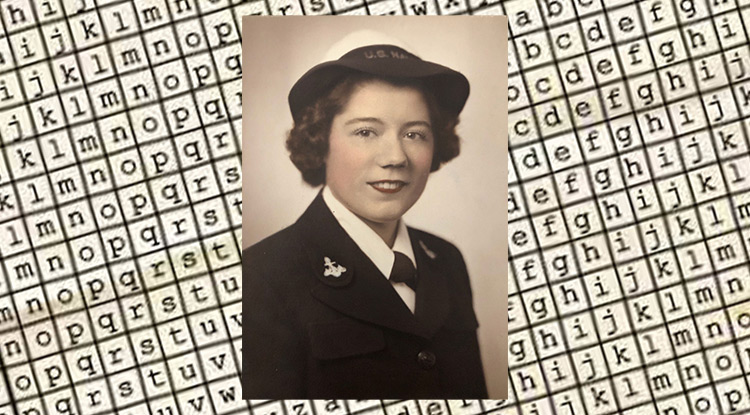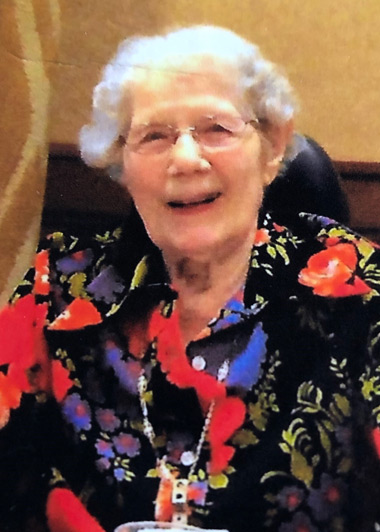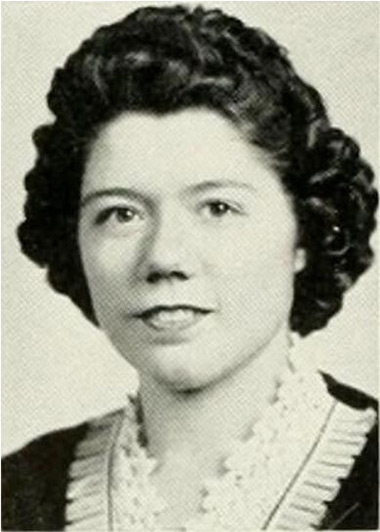
Dorothy Ramale was a senior in 1943 at Indiana State Teachers College when the dean of women, Florence Kimball, called her to her office to discuss an intriguing job offer.
The United States was heading into its second year of World War II, and the Army and Navy were scouring the country for intelligent women with strong analytical skills who could learn to decipher enemy codes. As an education major specializing in math, Ramale was exactly the type of candidate the military was seeking.

Now living in Springfield, Virginia, Dorothy Ramale will turn 100 in April 2021.

Dorothy Ramale in the 1943 Oak yearbook
Ramale, who will turn 100 in April, is featured in Code Girls, the Untold Story of the American Women Code Breakers of World War II, by Liza Mundy. This 2017 book explores the little-known impact these approximately 11,000 women had on the war. According to military officials, that impact included saving “many thousands of lives” in the Pacific theater alone and “shortening the war by no less than two years.”
Ramale grew up with sisters Alberta and Lucille on a farm near Cochran's Mills, a small town in Armstrong County. She attended high school in Apollo, and since there was no daily transportation, she and Alberta stayed in a boarding house during the week. In a 2018 interview with Judith Knudsen as part of an oral history project for the Arlington (Virginia) Public Library, Ramale recalled the St. Patrick's Day Flood of 1936 that washed away the boarding house while she, her sister, and others watched from across the street. As the house disintegrated in the rushing water, the woman who owned it exclaimed, “I just put those new curtains up last week!”
After graduating from high school, Ramale enrolled at Indiana State Teachers College in secondary education, following in the footsteps of her grandfather, who taught for 50 years. According to Mundy, Ramale took many high-level math courses and was often the only woman in her trigonometry classes, since “math was not a subject women were encouraged to study, and certain parts of the country had no female math teachers at all.”
Mundy covered the process the code breakers went through before their college graduation. Women selected for cryptanalysis work were sent envelopes containing a brief introduction to the history of codes and ciphers, along with numbered problem sets and strips of paper with the letters of the alphabet. The women were to complete the problem sets every week and turn them in. They learned which letters in the English language occurred with the greatest frequency, which letters were often paired together, such as s and t, and which appeared in triplets—est, ing, and ive—or in fours—tion. They also learned about various ciphers, including the Vigenère square, which works by shifting letters of the alphabet cyclically in a table. Ramale said she “would do a lesson, send it back, and then they'd send me another.” The process continued throughout her senior year.
Originally recruited by the US Army as a civilian, Ramale joined the Navy as an officer in the WAVES (Women Accepted for Voluntary Emergency Service) with the rank of Specialist Q and moved to Arlington, where the cryptanalysis unit was located. She spent a month in the WAVES Navy boot camp at Hunter College's Bronx branch (now Lehman College), where she learned about Navy traditions, customs, courtesy, and discipline and underwent daily two-hour marches, physical conditioning tests, and recreation before she returned to Arlington.
In an interview with Smithsonian magazine, Mundy said code breaking entailed days of staring at strings of nonsensical combinations of letters, seeking patterns in the alphabetical chaos. “With codes, you have to be prepared to work for months—for years—and fail.”
Mundy said the teams learned tricks to crack the messages, such as looking for the coded refrain “begin message here,” which sometimes marked the start of scrambled information. The key was to discover these “points of entry.”
“Their work was often mind-numbingly tedious and frustrating, as the women spent 12-hour days and seven-day weeks in steamy offices staring at incomprehensible columns of numbers and letters and trying to decipher patterns,” Mundy said. “They learned to recognize ciphers, where one letter is substituted for another letter or number, and to interpret ‘additives,' extra numbers thrown in to stump prying eyes. They built and operated ‘bombe' machines to decode the thousands of German messages sent out via the complex Enigma machine, work that was done in conjunction with Bletchley Park” in England.
Using information obtained from captured enemy units, “I'd sit at a table every day, and I'd have a paper with four-digit codes and a Japanese code book with all of the meanings of the four numbers,” Ramale told the Arlington library's Knudsen. Mundy wrote that Ramale “did such expert work as a ‘reader,' one of the most elite jobs, that she made a break into a Japanese code that led to the creation of a whole new unit.”
Ramale soon was moved to another section, where she decoded messages sent in a five-digit code. “You'd be surprised how much more difficult it is to learn five digits,” Ramale said. After successfully breaking codes about troop movements and the positions of Japanese destroyers, Ramale would hear news reports about successful American battles and think, “Oh, I knew about that.”
Ramale's sisters also joined the war effort, Lucille at the Pentagon and Alberta with the United Service Organizations.
Alberta's daughter, Anna Mae Allen, said that her family never knew what her aunt had accomplished during the war, since the code breakers were sworn to secrecy for many years. According to Mundy, they were warned, “just because they were female, that did not mean they would not be shot if they told anybody what they were doing.”
Allen said, “My aunt never told Lucille, even though she lived with her, but Lucille wasn't allowed to talk about her work in the Pentagon, either. Both Lucille and my mother passed away before the Code Girls book came out.”
After the war ended, Ramale went on to teach throughout the US, including in Michigan and Connecticut. She also fulfilled her childhood dream of traveling, reporting that she visited “all 50 states, all seven continents, and I've been around the world twice.”
Ramale used the GI Bill to continue her education, taking a year off from teaching to pursue a master's degree at the University of Pennsylvania before accepting a teaching position in Arlington. She recalled how the superintendent of the Arlington School District wanted to hire her, “because he knew that people who went to Indiana, Pennsylvania, the State Teachers College, were well trained.”
In 1951, Ramale began teaching at Yorktown High School in Virginia, becoming chair of the Math Department in 1964.
Throughout her career, she maintained a relationship with her alma mater, which became Indiana University of Pennsylvania in 1965. She was president of the alumni association from 1969 to 1971 and was active with the Washington, DC, alumni group. In 1977, she was honored with IUP's Citation for Service and named a Distinguished Alumna. Larry Judge '64, then director of alumni affairs, told the Indiana Gazette, “It is a matter of record that Miss Ramale has served the alumni association and thereby the university in virtually every way possible for a graduate to serve.”
Now living in a retirement facility in Springfield, Virginia, Ramale has difficulty hearing but has retained her sharp mind, her niece said. “She likes to do word puzzles and read her Bible,” Allen said.
In the Arlington library interview, Ramale reflected on her life, saying, “I enjoyed all my teaching, and I enjoyed all my traveling.”
As author Mundy told the director of the Veterans' History Project in the Library of Congress, “I just love the thought of these middle-school kids taking Miss Ramale's Algebra I class and having no idea that this sweet woman, who people remember as an incredible math teacher, had been such a badass code breaker during World War II.”